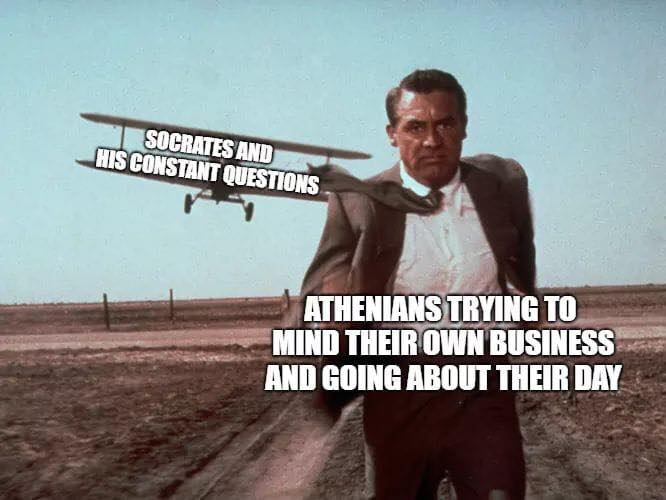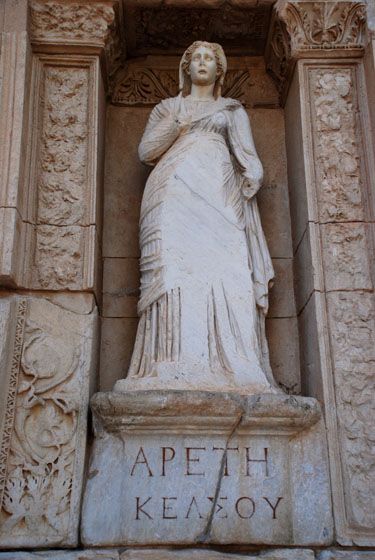


Personification of the Virtue (ἀρετή) of Celsus
The Library of Celsus, Ephesus, Turkey
And now for the good stuff!! We may comment on points of grammar as a part of our discussion and analysis of our texts each week, but we'll be concentrating on reading undiluted Greek. This class assumes that you have completed your study of Greek grammar using Oxford's Athenaze I and II, or an equivalent text.
Class Format
The goal of a reading course is to do just that: READ GREEK! Nothing will increase your proficiency faster than plowing your way headfirst through some serious Greek texts. So you will prepare texts for translation and discussion prior to the class session. During class we'll discuss the background of the author and may take time to note characteristics and idiosyncrasies of his Greek, but we'll spend our time translating.
I’ve chosen a text that gives you a lot of help – not just with vocabulary, but also with some of the more obscure points of grammar and with the historical context of this important work. This means that you shouldn’t have to spend a great deal of time in a Greek-English lexicon, and can instead focus on reading Greek. In addition, I'm going to share some resources with you that if used properly, will speed your acquisition of Greek. If abused, however, they'll slow your progress and make you dependent on them. The goal is to learn the text well and to fully understand it using nothing but the Greek itself by the time you get to class.
Class Email List
I will be emailing the class directly from our registration database. All communications to the entire class will include both students and parents, if we have both email addresses on file. It is your responsibility to inform us if your email address changes. Students are responsible for the content of all class emails, even if they have failed to inform us of a change in their email address.
Course Expectations and Requirements
- Complete your translation of the assigned passage and submit it by the deadline each week
- Use the text, class discussion, and your own review methods to improve your mastery of the Greek language
- Attend weekly classes, arrive on time, and stay for the entirety of the class session
- Actively participate in the live, online class session
- Be prepared to translate the passage aloud and explain the grammar in class
- Complete all required assignments on time and without reminders from the instructor
- Submit all assignments and quizzes as stipulated in other parts of this syllabus or presented in class
Textbooks
- Required: Plato's Apology of Socrates by Paul Allen Miller and Charles Platter (University of Oklahoma Press, 2010)
- Optional:The Brill Dictionary of Ancient Greek by Franco Montanari, (Brill Academic Pub, 2015) - Although this is pricey ($133), it’s still less than the so-called “Great Scott,” or unabridged version of the Lexicon listed above. It is scholarly, extensive, more modern, and easier to read than Liddell & Scott’s massive tome. I use it regularly. For the Classics student who’s looking for a complete Greek Lexicon, this is a great option.
- Optional: An Intermediate Greek-English Lexicon by Liddell and Scott, 7th ed. (Oxford University Press, 1945) - The standard Greek lexicon if you can't afford the "Great Scott"
- Optional: Introduction to Attic Greek by Donald J. Mastronarde (University of California Press, 2nd edition, 2013) - This is the book that I often use as a reference grammar. I find it more detailed than Athenaze, and its Index and Contents are easier to use.
Class Documents
Fonts
The default font in Quia (Arial Unicode MS) can be difficult to read. We will use the IFAO-Grec Unicode font. You MUST have this font installed on your computer for the Greek characters to display properly in the homework and quizzes - the link to the download page is below. Even so, Quia will use its default font on any of your answer entry boxes; I cannot change that.
|
|